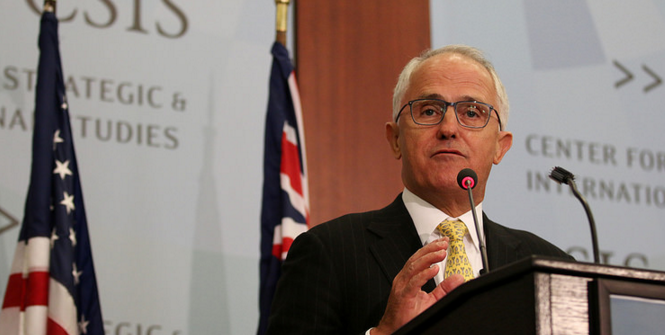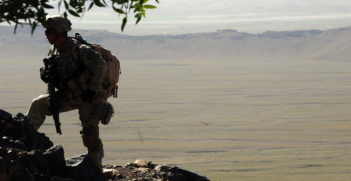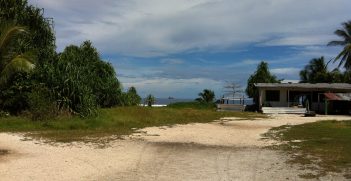Leaders Weigh Up a Challenging Year of Transitions in the Australia-US Relationship

Malcolm Turnbull has held talks with President Barack Obama at the White House on his first official visit to the US as Australian prime minister. With the fight against Islamic State (IS) in the Middle East high on the agenda, Obama had high praise for Australia’s involvement in the conflict.
2016 will be a year of transitions in the Australia-US relationship. Obama, who has become adept at welcoming new Australian prime ministers, has less than a year remaining in office. Against this backdrop of change are three important issues: the fight against IS, the challenges of China, and the passage of the Trans-Pacific Partnership (TPP).
There is also one final important transition – Australia’s enormously popular ambassador to the US, Kim Beazley, will soon be replaced by Joe Hockey.
Farewell Beazley
Australians know Beazley as an ALP stalwart, a former deputy prime minister and opposition leader. Americans know Beazley as one of Australia’s most effective interlocutors. Beazley’s knowledge and passion for American history and his love of ideas have made him a Washington favourite.
Beazley also brought to Washington an excellent understanding of Australia’s strategic challenges. He was no mere consumer of others’ strategic analysis; he quite capably generated his own.
What sometimes gets lost amid all this admiration is Beazley’s effectiveness in representing Australia’s cause. His 15,700-odd Twitter followers may not rival pop star Katy Perry, but his following is more than double than that of the outgoing British ambassador to the US, Peter Westmacott.
Not only was Beazley effective in articulating an Australian point of view, but he did so tirelessly. He will be a hard act to follow.
Turnbull’s challenges
Turnbull has already begun to put a different kind of stamp on the Australia-US relationship.
In a speech to the Center for Strategic and International Studies, Turnbull outlined his vision for co-operation between Australia and the US. Thucydides and a more nuanced view on how to address turmoil in the Middle East have replaced Tony Abbott’s more muscular approach.
For some in Washington there may be disquiet over Australia’s decision not to increase its troop deployment to Iraq. Turnbull explained:
Other nations with larger economies, larger defence forces and closer to the theatre are beginning to step up their commitments. As they should.
While other countries must do more to support the anti-IS coalition, Turnbull observed:
The destruction of ISIL [Islamic State in Iraq and the Levant, another name for IS] requires military action including boots on the ground. But they must be the right boots on the right ground.
Many in Washington will applaud this call.
In the speech, Turnbull also touched upon the other issue that exercises minds in Washington – China.
Two challenges emerge from China that test the Australia-US relationship. Turnbull turned to Athenian philosopher and historian Thucydides to illustrate the problem. Thucydides described the rising power of Athens leading to Sparta’s intemperate and violent reaction. Will China’s rise come about peacefully or not?
China’s conversion of water-logged atolls and reefs in the South China Sea into airstrips and harbours provide grounds for concern. Australia’s support of freedom-of-navigation patrols is an important adjunct to American efforts. Both the US and Australia share an interest in China’s peaceful rise. It is hard to see how the territorial dispute in the South China Sea will be easily resolved.
Turnbull wisely called for calm:
Australia has no claims in the South China Sea, nor do we make any judgement on the legitimacy of any of the competing claims. We urge all parties, not just China, to refrain from further construction on those islands or reefs, and to refrain from militarisation.
Whether anybody listens to these soothing words remains to be seen.
The second equally complex threat to international peace and stability is the Chinese economy. China can barely manage its increasingly complex and opaque economy. The International Monetary Fund released its World Economic Outlook update the same day Turnbull met Obama. This projected a weakening Chinese economy, with Chinese growth slowing to 6.3 percent in 2016 and 6 percent in 2017.
The questions for the Australia-US relationship are the extent to which the slowing Chinese economy will have a spillover effect, and how deeply a weakening Chinese economy will impact domestic stability.
The final challenge concerns the TPP. The timing of congressional approval of the trade deal remains a mystery. In this, a presidential election year, the TPP may not make much progress.
The TPP’s signing is high on Australia’s list of achievements in Washington. Unfortunately, real success depends more on individual members of Congress than it does on anything the White House might want.
Turnbull, in his meeting with Obama, made clear the TPP’s importance. He claimed that ‘the critical thing is the way it promotes the continued integration’ of the Asia-Pacific’s economies, which is an important peg in regional security. Passage of the TPP may well be important, but members of Congress may be more concerned about their own re-election.
Such are the challenges of Washington.
Alan Tidwell is the Director of the Center for Australian, New Zealand and Pacific Studies, Georgetown University. This article originally appeared on The Conversation on 20 January. It is republished with permission.




